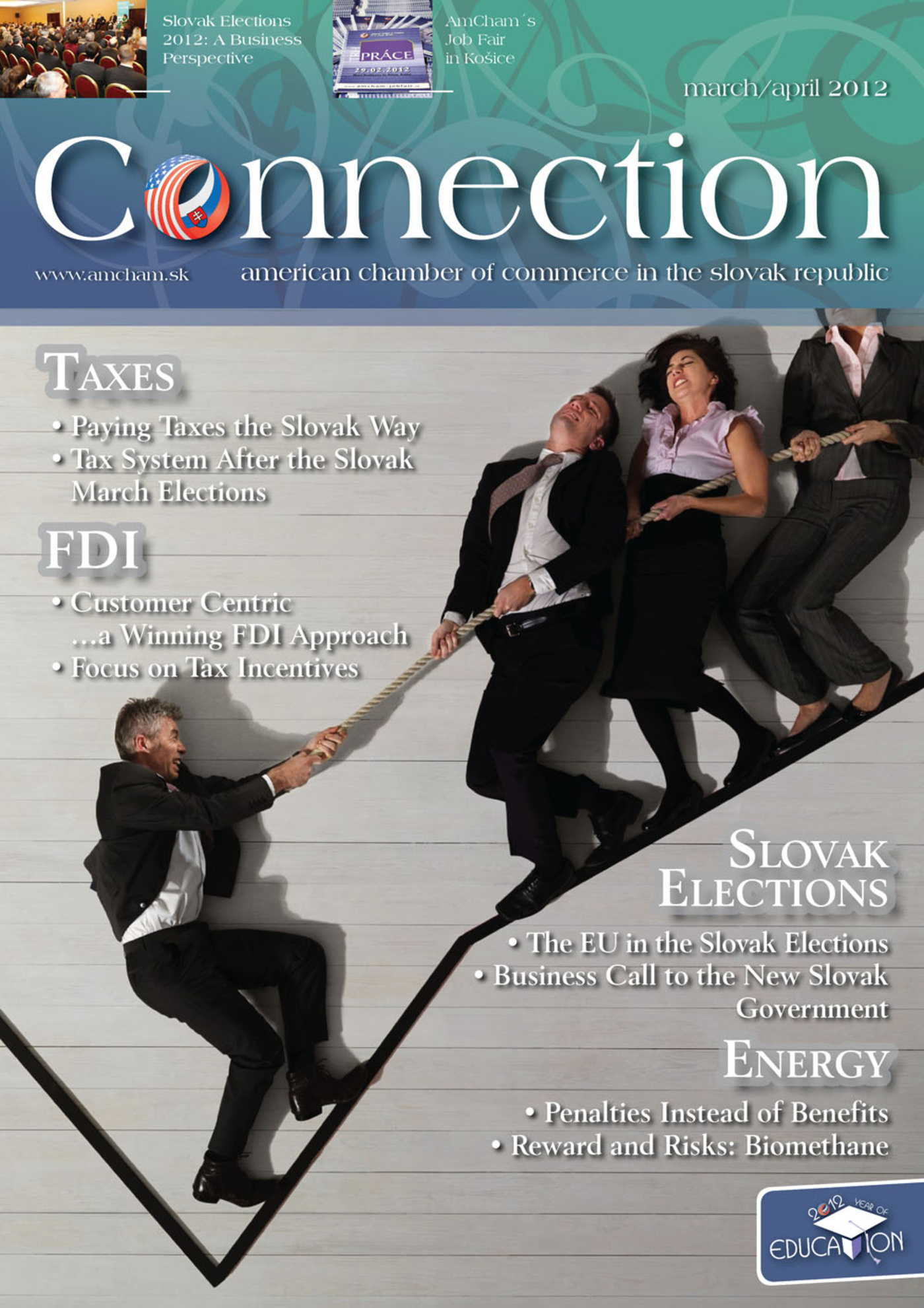
Download PDF
- Business Call to the New Slovak Government 2012
- The EU in the Slovak elections
- Penalties instead of benefits
- Rewards and risks: Biomethane
- Customer centric… a winning FDI approach
- Focus on tax incentives
- Milestones for future tax reform in Slovakia
- Tax system after the Slovak elections
- Paying taxes the Slovak way
- The Possibilities and Limits of Our Future
Slovak Elections & FDI, Taxes, Energy
Business Call to the New Slovak Government 2012
Two days after the outcome of the Slovak Parliamentary Elections, on March 12, 2012, representatives of twelve foreign chambers of commerce in Slovakia called upon the new government to lead an open and constructive dialogue with the business community and respect general business interests in its manifest.
The EU in the Slovak elections
The unprecedented crisis in the EU has led Slovak political parties to realize that developments in the Union can have a serious impact on their political destiny as well. In spite of this as a campaign topic, Europe remains far from the spotlight, as do many relevant topics.
Prepared by AmCham member: EurActiv.sk
Penalties instead of benefits
Slovak enterprises have the second most expensive electricity in the EU after Cyprus, whose high prices are partially explained by the lack of options for foreign electricity trade. According to a study by the Financial Policy Institute (IFP) at the Slovak Finance Ministry, the price of electricity for Slovak enterprises is above the European average.
Prepared by AmCham member: U. S. Steel Košice
Rewards and risks: Biomethane
Despite a number of restrictions which were passed by the Slovak and Czech parliaments last year (especially in the solar sector), there are still areas of renewable energy production that could be attractive for investors. Ambitious EU policy requires member states to meet certain goals for renewable energy.
Prepared by AmCham member: Giese & Partner
Customer centric… a winning FDI approach
In December, AmCham presented its “Investing in Slovakia’s future: Building on our strengths and realizing our potential – The 10 steps to winning the FDI race”. This conference successfully illustrated the fact that AmCham and its members, including KPMG in Slovakia, are committed to attracting FDI and further enhancing the success and competitiveness of Slovakia.
Prepared by AmCham member: KPMG
Focus on tax incentives
In last year’s issue we informed you about the planned amendment to the
Act on Investment Aid. This amendment has been adopted and came into
force on 1 August 2011. Compared to its draft it contains several
positive changes. A summary of these changes along with currently
applicable rules follows below.
Prepared by AmCham member: BMB Leitner
Milestones for future tax reform in Slovakia
The tax and contribution reform in Slovakia that was prepared (and was subject to approval procedure) in 2011 was a reaction to deficiencies in the Slovak tax and contribution system and was to improve the business environment in Slovakia. The reform was aimed at reducing the high administrative burden (multiple reporting of the same data to several institutions), time intensiveness and the costs of fulfilling tax and contribution obligations by undertakings.
Prepared by AmCham member: IB Grant Thornton Consulting
Tax system after the Slovak elections
Most people in the world would answer a question regarding the ideal tax amount of tax by saying zero. However, taxes exist on the basis of a social consensus with the aim of funding public expenses. The amount of tax is always related to the amount of public expenditures, i.e. to the degree of redistribution of resources in the economy by the state.
Prepared by AmCham member: BK Team Consulting
Paying taxes the Slovak way
Prepared by AmCham member: PwC
The 2012 Paying Taxes study measured the ease of paying taxes for businesses in 183 countries. The objective is to compare and benchmark tax systems around the world. The study is performed each year by The World Bank, IFC and PwC and the results are widely publicized.
The Possibilities and Limits of Our Future
Letter to members by Oľga Gyárfášová, Institute for Public Affairs.
The results of early general election were indeed historical: a clear majority of MP mandates (83 out of 150) went to a single political party – Smer-SD – which means there will be a single-party government. The election results show citizens’ great trust in a future shaped predominantly by Smer. Five center-right parties are in the opposition. It is essential that these parties stop endlessly addressing their own internal issues and instead become a strong opposition force from Day 1 of the new electoral period.

Follow us